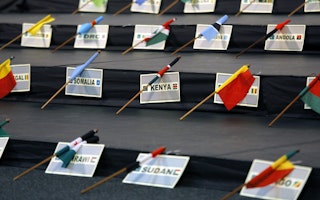Ugandans Find a Reason to Vote in Their Rigged Elections
By Rita Nalumansi

For three election cycles in Uganda I have been eligible to vote, but the 2016 election was the first time I actually bothered to go to the polls. I had my reasons for abstaining.
The first time I was eligible, in 2006, I was focused on my high school final exams. In 2011, I decided to abstain because, like many, I believed the election would be rigged.
Then February 2016 came along. I still had mixed feelings about participating in the process—I didn’t really support any of the candidates, but voting day arrived and at 7:00 a.m., I found myself at the polling station. To my dismay, there was no activity—just a lone polling assistant who informed me that the voting materials had not been delivered. I went back home, dispirited, but not surprised.
My experience was far from unique. A recent report by the Foundation for Human Rights Initiative strongly criticized Uganda’s 2016 elections, concluding that they violated many basic rights, including the right to vote, freedom of expression, and freedom of assembly. Dr. Kizza Besigye, the runner-up, has been arrested over 43 times since the last election in 2011, even though no charges against him have been conclusively heard in a court of law. The report also found that space for the media to operate freely was restricted, with more than 100 cases of attacks on journalists, most of them by the Uganda National Police.
When I got home after unsuccessfully trying to vote, my grandmother insisted I go back to the polls, saying it was my civic duty to do so. It didn’t even matter who I voted for, she said. What mattered was that I cast my vote.
Even if we all thought the election would be rigged, not exercising our right to cast a ballot would only make matters worse. By casting a vote, Ugandans would effectively be demonstrating their belief in the democratic process. Everyone was determined to show the powers that be that we understood the importance of our vote.
We returned to the polling station at 9:00 a.m., where long lines and no voting materials greeted us once again. The lines were fairly orderly, quiet, and strangely calm; there was resilience to these lines. I found my auntie, who had already arrived, and we joined the patiently waiting masses. Young people came to help keep order because of the shortage of polling assistants.
As the day wore on, I wondered what kept all these people from walking away. The sun blazed down with a vengeance as we tried to keep cool by pouring bottles of water over our heads. The determination on display was both inspiring and a little perplexing. Everyone seemed to harbor the unshakable belief, however irrational, that this time our vote would make a difference.
We had been in line for about four hours when the voting materials finally arrived. At three o’clock, we reached the voter verification table, only to be told we were in the wrong line. I was livid, but my auntie refused to let me leave. “You have been here for four hours in the sun, what will another four matter?” she said. “Don’t go home, let us stay and vote.” She said it with such intensity that I was taken aback.
By five o’clock, we reached the correct verification table, where we were met by an illiterate assistant whose job it was to verify our names. It took him 10 tries to get my auntie’s name right.
One thing from that day I will always remember is the old woman who stood in front of me in line. She handed over her identity card and refused to budge when told she was at the wrong polling station. This aged citizen of Uganda calmly announced she was not leaving until she voted. In the end, she was allowed to vote, because clearly she was not going away.
After all the drama, I cast my vote and went home to sit with my granny, who’d had a similar experience at her own polling station: late ballots, endless lines, and now, a long wait for the tally.
We waited until about eleven o’clock to hear the returns. Even as provisional results were read, the tallies from our polling stations and many others remained inconclusive. To this day, we don’t know the results. This happened in five major voting districts around the country—all of them opposition strongholds. President Museveni, in power since I was eight years old, was declared the winner in a landslide.
What we do know is that the massive turnout that day made a statement. In spite of the result, I was glad I voted. Voting that day was like casting a ballot in favor of democracy itself. It’s one thing to vote for change; it’s another to know that your vote will probably not bring the change you desire, and then to vote anyway, hoping for the best.
Rita Nalumansi is a program assistant with the Open Society Initiative for Eastern Africa.


